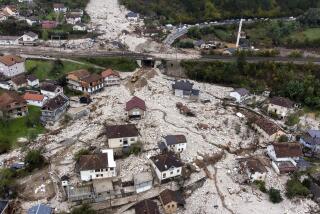EC Urges End to Yugoslav Violence, Threatens Aid Cut : Europe: In an attempt to flex its political muscle, the 12-nation group sends a mission to Belgrade.
- Share via
LUXEMBOURG — Threatening to cut off as much as $4 billion in foreign aid, European Community leaders dispatched three of their foreign ministers to Yugoslavia on Friday to demand an end to violence that threatens to split the nation.
“Europe must stop the evolution toward civil war in Yugoslavia,” said Italian Prime Minister Giulio Andreotti as leaders of the 12 EC nations convened in Luxembourg for their semiannual summit.
The mission to Belgrade of the Italian, Luxembourg and the Netherlands foreign ministers carries the blessing of the United States, which has branded the crisis primarily a European affair. At stake is not only the future of Yugoslavia but also the ability of the European Community to wield political muscle on the global stage.
“This is the hour of Europe, not the hour of the Americans,” said Luxembourg Foreign Minister Jacques Poos as he left for Yugoslavia.
America’s own strenuous diplomatic efforts failed to stop declarations of independence on Tuesday by the Yugoslav republics of Slovenia and Croatia--and the Yugoslav government’s decision to send tanks into Slovenia to crush that rebellion.
The three EC foreign ministers expect to return to Luxembourg late today, before the end of the EC summit.
The EC leaders, meeting as Yugoslav warplanes bombed Slovenian targets before a cease-fire began late Friday, also set in motion the crisis management procedures of the 35-nation Conference on Security and Cooperation in Europe. Some of the procedures were adopted only last week.
Officials said that more than the necessary 13 members of the CSCE had agreed to call a crisis management session, which, according to officials in Luxembourg, could occur as early as next Monday in Prague. Joining the 12 EC nations in making that call were Austria, Czechoslovakia, Hungary and Switzerland.
That would make the Yugoslav crisis the first test of the post-Cold War system of protecting peace and security in Europe. In the CSCE are all European countries, including the Soviet Union and Yugoslavia, as well as the United States and Canada.
Here in Luxembourg, Yugoslavia dominated the first day of a two-day meeting that had been originally intended to focus on the EC’s progress toward adopting a common currency and setting joint foreign and security policy.
The EC leaders established a list of demands, including an end to the fighting and a three-month moratorium on the effect of the declarations of independence. Like the United States, the EC countries have refrained from recognizing Slovenia and Croatia as independent republics.
At the same time, the leaders called for respect for “territorial integrity as well as human rights . . . and minority rights.” They pressed for economic reforms and a dialogue between authorities of Yugoslavia’s central government and its rebellious republics.
“If this mission fails, we will freeze all economic and financial aid to Yugoslavia,” said President Jacques Santer of Luxembourg, which holds the rotating EC presidency.
At stake, said an EC official in Luxembourg, is a $920-million package of loans and loan guarantees completed by EC and Yugoslavian officials last Monday.
Also in the balance is the EC contribution to the pending $4.1-billion Yugoslavian share of the so-called G-24 aid to Eastern Europe--assistance from the world’s group of 24 industrial nations. The EC and its members have pledged more than $3 billion of that total.
A French spokesman suggested a difference of emphasis between German Chancellor Helmut Kohl and French President Francois Mitterrand in their expectations for the EC mission to Yugoslavia.
Mitterrand reportedly stressed guaranteeing Yugoslavia’s continued existence as a country. The spokesman quoted him as telling the other leaders: “The (European) Community should not be opposed to self-determination, but neither should it be accused of treating territorial integrity lightly.”
Kohl, by contrast, underlined the importance of self-determination. “It’s unacceptable that today, in Europe, people are being shot, or that suddenly the right of self-determination should no longer play a role,” he told reporters.
The Yugoslav crisis could provide a test of the EC nations’ efforts to act as a single diplomatic power.
An EC committee is midway toward its goal of completing a treaty this year spelling out which powers belong to the EC and which to the member nations.
Researcher Isabelle Maelcamp, in Luxembourg, contributed to this story.
More to Read
Sign up for Essential California
The most important California stories and recommendations in your inbox every morning.
You may occasionally receive promotional content from the Los Angeles Times.









